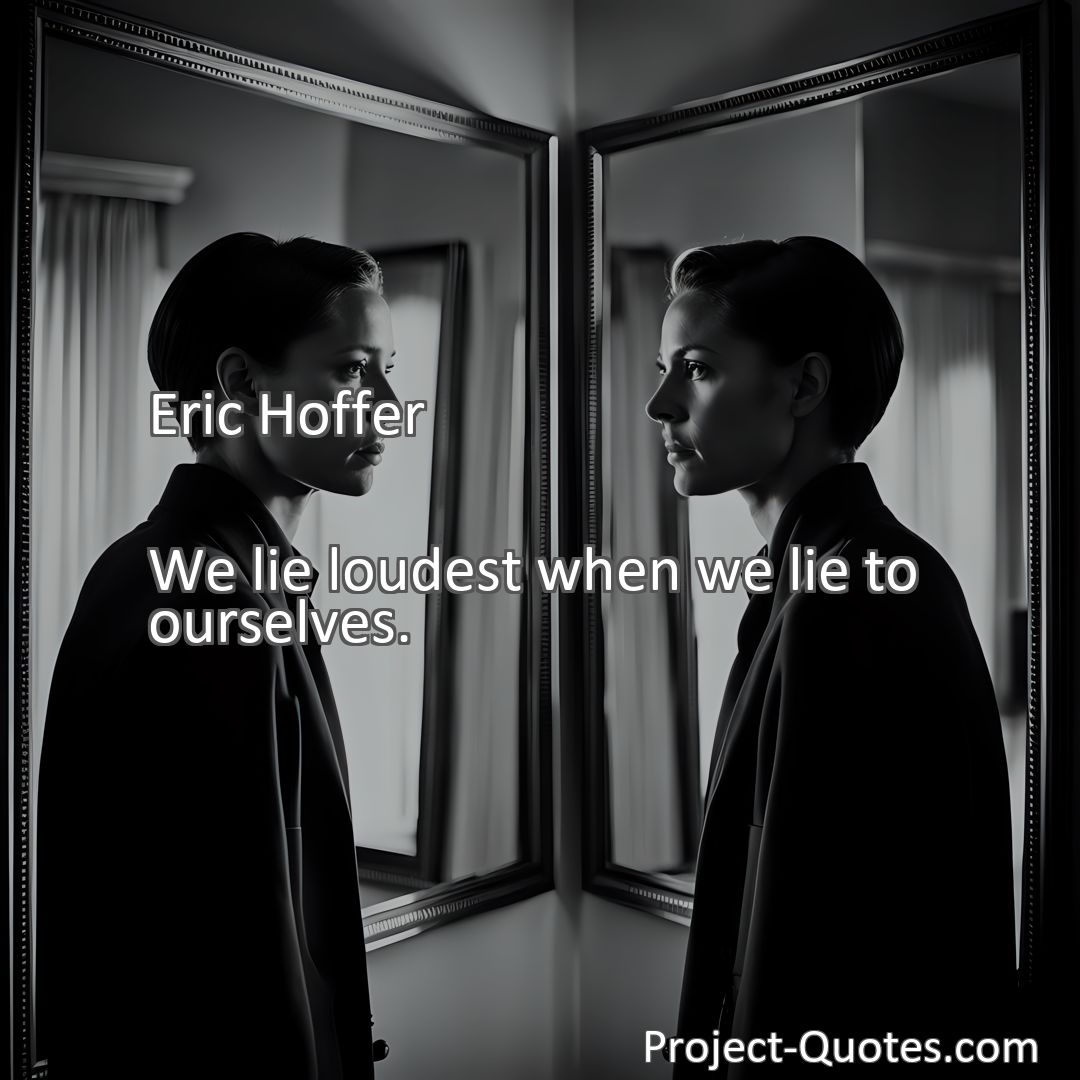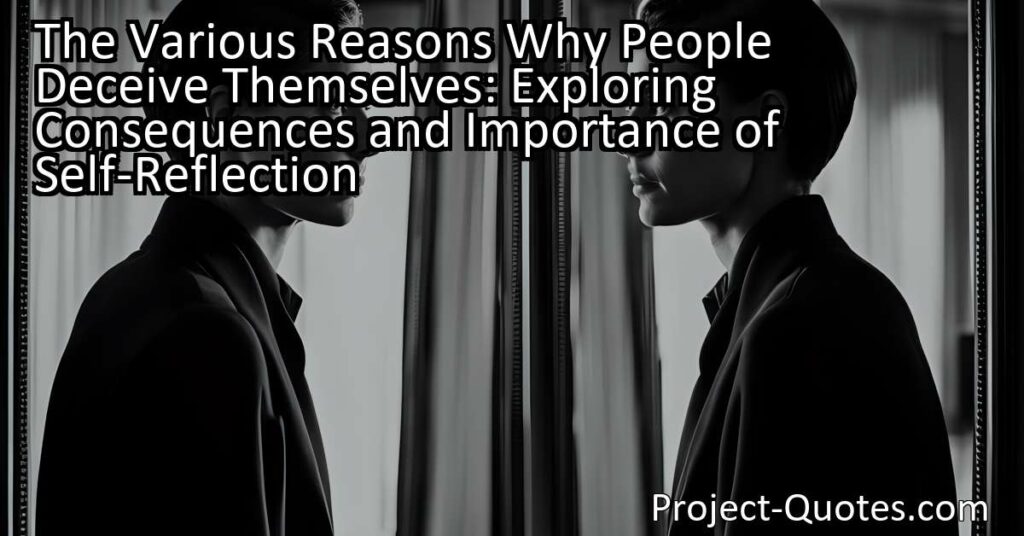We lie loudest when we lie to ourselves.
Eric Hoffer
In this article, we explore the various reasons why people deceive themselves, the consequences of doing so, and the importance of self-reflection. People often deceive themselves out of fear of facing the uncomfortable truth or to maintain a positive self-image. However, this self-deception hinders personal growth, damages relationships, and affects our mental well-being. Through self-reflection, self-compassion, and seeking external feedback, we can break free from this destructive cycle and live a more honest and authentic life.
Table of Contents
Meaning of Quote – We lie loudest when we lie to ourselves.
Have you ever noticed that sometimes we tend to deceive ourselves more than anyone else? It’s as if we create a fictional version of reality in order to avoid facing the truth. As the famous quote goes, “We lie loudest when we lie to ourselves.” This powerful statement reveals the complex nature of self-deception and the impact it can have on our lives. In this article, we will explore the various reasons why people deceive themselves, the consequences of doing so, and ultimately, the importance of self-reflection and honesty.
One of the main reasons why we lie to ourselves is the fear of facing the uncomfortable truth. It can be difficult to accept certain realities about ourselves, such as our flaws, mistakes, or the consequences of our actions. We may prefer to escape from these uncomfortable truths by creating a distorted version of reality. By doing so, we create a false sense of security and protect ourselves from the discomfort that facing the truth may bring. However, this self-deception only perpetuates a cycle of ignorance and prevents personal growth.
Another reason we deceive ourselves is the desire to maintain a positive self-image. We all have a natural inclination to see ourselves in a positive light. This desire for self-affirmation often leads us to overlook or downplay our own shortcomings and mistakes. We may rationalize our behavior, create justifications, or even deny reality altogether. By doing so, we convince ourselves that we are better, more righteous, or more competent than we truly are. While this may provide a temporary boost to our self-esteem, it hinders our ability to learn from our experiences and improve ourselves.
Furthermore, societal pressures and expectations can contribute to our tendency to lie to ourselves. Society often imposes certain norms and standards that we feel compelled to meet. When we fall short of these expectations, we might choose to deceive ourselves rather than confront the disappointment or judgments of others. We may convince ourselves that we are conforming to societal ideals, even if deep down, we know we are compromising our own values or aspirations. This self-deception ultimately erodes our authenticity and prevents us from living a life true to ourselves.
The consequences of lying to ourselves can be far-reaching. Firstly, self-deception hinders personal growth and development. By refusing to acknowledge our weaknesses or mistakes, we deprive ourselves of valuable opportunities for learning and improvement. Growth happens when we confront our challenges head-on, but self-deception holds us back from this transformative process.
Moreover, self-deception often spreads into our relationships with others. If we are not honest with ourselves, how can we be genuine and truthful with those around us? Dishonesty, even if directed inward, has a way of seeping into our interactions with others. It erodes trust and authenticity in our relationships, leaving a trail of misunderstandings and broken connections. By lying to ourselves, we inadvertently distance ourselves from the people we care about, creating barriers to truly meaningful connections.
In addition to hindering personal growth and damaging relationships, self-deception also affects our mental and emotional well-being. When we constantly lie to ourselves, our internal world becomes a tangled web of contradictions and falsehoods. This internal conflict can lead to feelings of guilt, shame, and anxiety. We may become disconnected from our authentic emotions and lose touch with our true desires and aspirations. Living in denial and self-deception robs us of the potential for genuine happiness and contentment.
So, how can we break this cycle of self-deception and embrace a more honest and authentic way of living? The first step is self-reflection. Taking the time to honestly assess ourselves and our actions can be uncomfortable, but it is essential for personal growth. Rather than rationalizing or denying our mistakes, we should examine them objectively and learn from them. Self-reflection allows us to see ourselves more clearly and to embrace personal accountability.
Another important aspect is cultivating self-compassion. It is vital to remember that we are all imperfect beings and that making mistakes is a natural part of the human experience. Instead of judging ourselves harshly, we can choose to show kindness and understanding towards ourselves. By doing so, we create a supportive environment for growth and self-improvement.
Additionally, seeking feedback from others can provide valuable insights and help us overcome self-deception. Sometimes, an outsider’s perspective can shed light on our blind spots and bring forth the truths we have been avoiding. It takes courage to ask for feedback and truly listen to it without becoming defensive or dismissive. However, this openness to constructive criticism can lead to personal growth and an increased level of self-awareness.
In conclusion, the quote “We lie loudest when we lie to ourselves” encapsulates the profound impact self-deception can have on our lives. Whether driven by fear, desire for self-affirmation, or societal pressures, self-deception hinders personal growth, damages relationships, and negatively affects our mental well-being. It is only through self-reflection, self-compassion, and seeking external feedback that we can break free from the destructive cycle of self-deception. Embracing honesty and authenticity leads to personal growth, fulfilling relationships, and ultimately, a more meaningful and fulfilling life.
I hope this quote inspired image brings you hope and peace. Share it with someone who needs it today!


